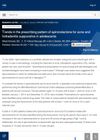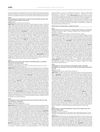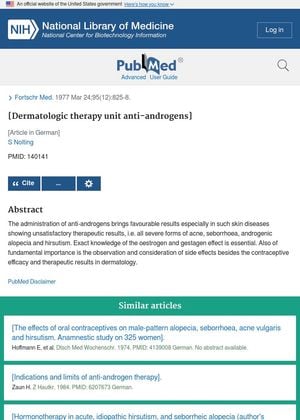TLDR Anti-androgens can help treat tough skin conditions like severe acne and excessive hair growth.
In 1977, a study by S. Nolting found that the use of anti-androgens had positive effects on skin conditions that were otherwise difficult to treat, including severe forms of acne, seborrhoea, androgenic alopecia (hair loss), and hirsutism (excessive hair growth). The study emphasized the importance of understanding the effects of oestrogen and gestagen, as well as monitoring and considering potential side effects alongside the contraceptive efficacy and therapeutic results in dermatology.
 4 citations
,
December 2021 in “Journal of The American Academy of Dermatology”
4 citations
,
December 2021 in “Journal of The American Academy of Dermatology” Doctors are prescribing spironolactone more often to treat acne and skin conditions in teenagers, and it seems safe and well-tolerated.
 1 citations
,
September 2020 in “Actas Dermo-Sifiliográficas”
1 citations
,
September 2020 in “Actas Dermo-Sifiliográficas”  2 citations
,
September 2016 in “Journal of skin and stem cell”
2 citations
,
September 2016 in “Journal of skin and stem cell” Acne is strongly linked to high BMI, hair loss, menstrual issues, family history, and eating too many sweets and fatty foods, but not to excessive hair growth.
3 citations
,
November 2013 in “PubMed”  97 citations
,
July 2006 in “Dermatologic therapy”
97 citations
,
July 2006 in “Dermatologic therapy” The document concludes that accurate diagnosis and personalized treatment are important for skin problems in women with PCOS.
 101 citations
,
January 1985 in “British Journal of Dermatology”
101 citations
,
January 1985 in “British Journal of Dermatology” Spironolactone is effective for treating acne, hirsutism, and androgenic alopecia in women with few side effects.





